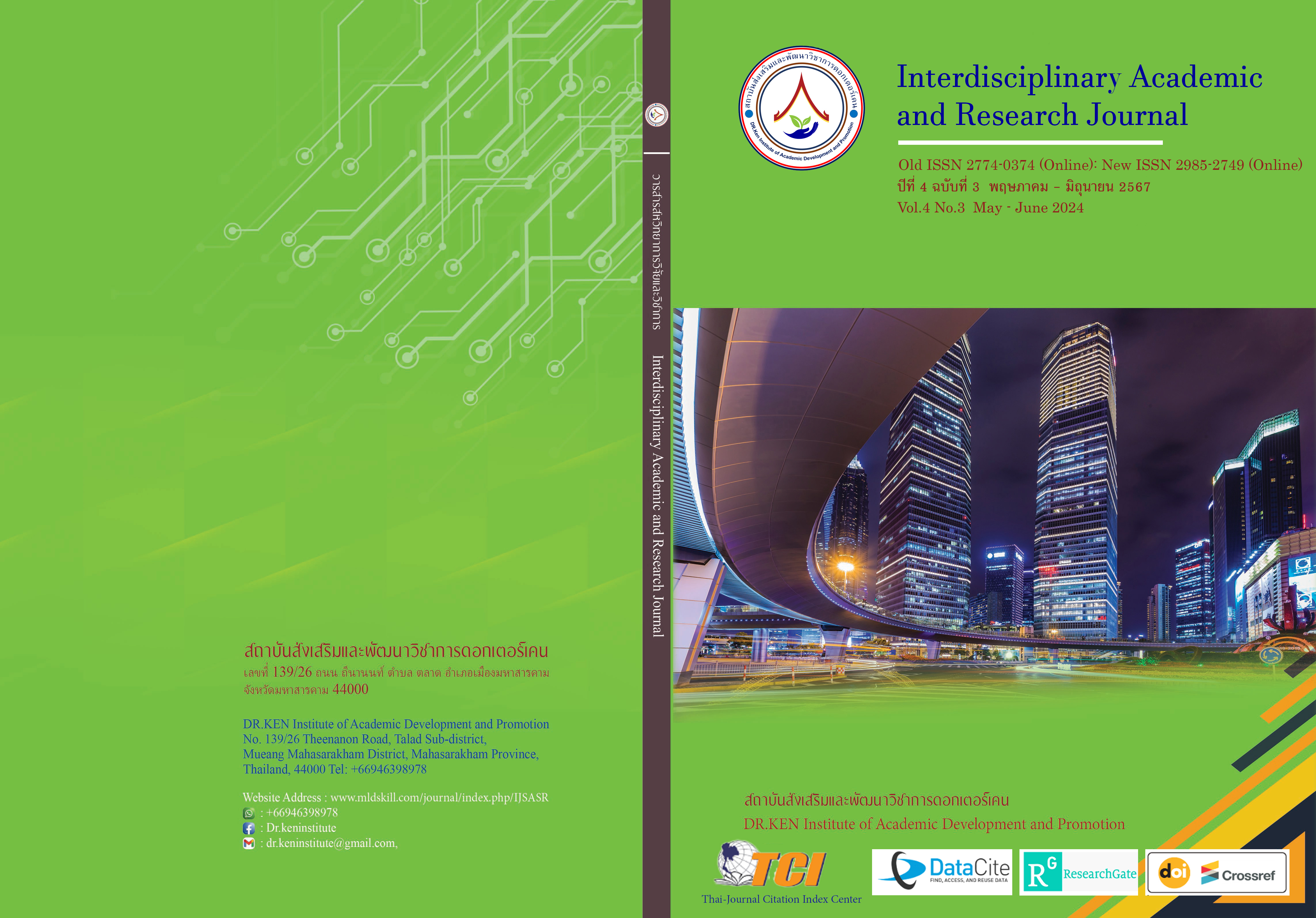Waste Management Knowledge and Public Participation Affecting Waste Management Efficiency of the People in Akat Sub-district Administrative Organization, Akat Amnuai District, Sakon Nakhon Province
DOI:
https://doi.org/10.60027/iarj.2024.275354Keywords:
Knowledge; , Waste Management; , Public Participation; , Waste Management EfficiencyAbstract
Background and Aims: Factors that cause many countries to face the problem of solid waste are population growth, economic expansion, and technological advancement. The change in people's consumption behavior, causes the amount of waste and leftovers to increase and tends to increase every year. The purposes of this study included the following: 1) To investigate the level of waste management knowledge, public participation, and waste management efficiency of the people in Akat Sub-district Administrative Organization, 2) To study the influences of waste management knowledge and public participation on the waste management efficiency of the people in Akat Sub-district Administrative Organization, and 3) To explore and gain the model for developing waste management efficiency of the people in Akat Sub-district Administrative Organization.
Methodology: The samples consisted of 381 people who lived in Akat Sub-district Administrative Organization, Akat Amnuai District, Sakon Nakhon Province. The questionnaire was used as the tool for data collection and statistics employed for data analysis incorporated frequency, percentage, mean, standard deviation, and Multiple Regression Analysis.
Results: (1) Waste management knowledge of the people as a whole, was at the high level. Overall, public participated in waste management was at a moderate level. Furthermore, waste management efficiency as a whole, was at a high level. (2) In light of the people’s waste management knowledge, these aspects influenced waste management efficiency and they could be used all together to correctly predict the people’s waste management efficiency 31.60 percent (R2Adj=.316) with statistical significance at .01 level: the negative effects of the waste (β=.170), waste management (β=.148), types of the waste (β=.145), and the meanings of the waste (β=.131). Regarding public participation, these aspects of public participation the exclusion of taking part in receiving the benefits, influenced waste management efficiency and they could be used jointly to correctly predict waste management efficiency for 48.40% (R2Adj=.484) with statistical significance at .01 level: waste management operation (β=.283), decision making (β=.156), and the evaluation (β=.131). And (3) These suggestions were provided for developing a waste management efficiency model to (3.1) Conduct a campaign to raise awareness and provide knowledge about solid waste management to the people. (3.2) Should campaign and encourage people to participate in solid waste management. (3.3) Collaborate with relevant agencies and community leaders to create a joint mechanism to change the correct waste management behavior of the people.
Conclusion: The study indicates a high level of waste management knowledge and efficiency among the populace, coupled with moderate public participation. However, leveraging these factors, alongside targeted campaigns and collaborative efforts, is pivotal in optimizing waste management practices and enhancing efficiency.
References
เบญจพรรณ สุวรรณท้าว. (2558). การมีส่วนร่วมของประชาชนในการจัดการขยะมูลฝอยขององค์การบริหารส่วนตำบลนาเลิง อำเภอเสลภูมิ จังหวัดร้อยเอ็ด. สารนิพนธ์รัฐประศาสนศาสตรมหาบัณฑิต: มหาวิทยาลัยมหามกุฏราชวิทยาลัย วิทยาเขตร้อยเอ็ด.
กรมควบคุมมลพิษ กระทรวงทรัพยากรธรรมชาติและสิ่งแวดล้อม. (2559). แผนแม่บทการบริหารจัดการขยะมูลฝอยของประเทศ (พ.ศ. 2559 – 2564). กรุงเทพฯ: บริษัท แอคทีฟพริ้นท์ จำกัด.
กรมควบคุมมลพิษ. (2562). คู่มือการกรอกข้อมูลการจัดการขยะมูลฝอย ตามแบบ คพ. 1 2 และ 3 ปี พ.ศ. 2562. กรุงเทพฯ: กรมควบคุมมลพิษ กระทรวงทรัพยากรธรรมชาติและสิ่งแวดล้อม.
จอมจันทร์ นทีวัฒนา และวิชัย เทียนถาวร. (2559). ความรู้และทัศนคติที่ส่งผลต่อพฤติกรรมการลดขยะชุมชนแม่กา อำเภอเมือง จังหวัดพะเยา. วารสารวิทยาศาสตร์และเทคโนโลยี, 25(2), 316-330.
จอมตวัญจ์ อาคมานนท์ และนาวาอากาศเอก ปัญญา ศรีสิงห์. (2563). ความรู้และการรับรู้ที่มีต่อพฤติกรรมในการจัดการขยะพลาสติก ของคนกรุงมหานคร. วารสารสมาคมนักวิจัย. 25 (3), 171-185.
ชนัญชิดา พิมสุคะ. (2563). ความรู้ในการจัดการขยะมูลฝอยและพฤติกรรมการจัดการขยะมูลฝอยที่ส่งผลต่อประสิทธิภาพในการจัดการขยะมูลฝอยของประชาชนในเขตอำเภอเมืองสกลนคร จังหวัดสกลนคร. วิทยานิพนธ์รัฐประศาสนศาสตรมหาบัณฑิต: มหาวิทยาลัยราชภัฏสกลนคร.
ชัยณรงค์ ทองชาติ. (2565). รูปแบบการจัดการขยะแบบมีส่วนร่วมของชุมชนตำบลนางพญา อำเภอท่าปลา จังหวัดอุตรดิตถ์. วิทยานิพนธ์สาธารณสุขศาสตรมหาบัณฑิต: มหาวิทยาลัยราชภัฏอุตรดิตถ์.
ณัฐวุฒิ ผดุงเพียร. (2560). ปัจจัยที่มีผลต่อประสิทธิภาพในการบริหารจัดการขยะของเทศบาลนครพระนครศรีอยุธยา จังหวัดพระนครศรีอยุธยา. สารนิพนธ์รัฐประศาสนศาสตรมหาบัณฑิต กรุงเทพฯ: มหาวิทยาลัยสยาม.
ธีรวรรณ บุญโทแสง. (2559). ความรู้ ทัศนคติ และพฤติกรรมเกี่ยวกับการจัดการขยะ ของหมู่บ้านนางแลใน ตำบลนางแล อำเภอเมือง จังหวัดเชียงราย. วิทยานิพนธ์วิทยาศาสตรมหาบัณฑิต: มหาวิทยาลัยราชภัฏอุบลราชธานี.
นภัสรพี แถบเงิน. (2565). ความรู้เกี่ยวกับการจัดการขยะและการมีส่วนร่วมของประชาชนที่มีผลต่อประสิทธิภาพการจัดการขยะของประชาชนในเขตเทศบาลนครสกลนคร. วิทยานิพนธ์รัฐประศาสนศาสตรมหาบัณฑิต: มหาวิทยาลัยราชภัฏสกลนคร.
ปาลิดา สามประดิษฐ์. (2559). การรับรู้ข่าวสาร ทัศนคติ และความรับผิดชอบทางสังคมที่ส่งผลต่อการตัดสินใจใช้ถุงผ้าบรรจุสินค้าที่ ซื้อจาก Tops Market ของคนในกรุงเทพมหานคร. การค้นคว้าอิสระบริหารธุรกิจมหาบัณฑิต: มหาวิทยาลัยกรุงเทพ.
รัฐพล ศรีธรรมา และเกวลิน ศีลพิพัฒน์. (2560). การมีส่วนร่วมของประชาชนและประสิทธิภาพการจัดการขยะของเทศบาลตำบลเขาพระงาม อำเภอเมืองจังหวัดลพบุรี. รายงานการวิจัย. กรุงเทพฯ: มหาวิทยาลัยเกษตรศาสตร์ วิทยาเขตบางเขน.
วสันต์ ศรีโยธี. (2563). รูปแบบพัฒนาพฤติกรรมการจัดการขยะของประชาชนในเขตอำเภอเซกา จังหวัดบึงกาฬ. วิทยานิพนธ์รัฐประศาสนศาสตรมหาบัณฑิต: มหาวิทยาลัยราชภัฏสกลนคร.
วัฒนณรงค์ มากพันธ์ และคณะ. (2561). ความรู้ ความเข้าใจ และพฤติกรรมการจัดการขยะของประชาชนในเขตเทศบาลนครตรัง จังหวัดตรัง. รายงานการวิจัย. นครศรีธรรมราช: คณะวิทยาศาสตร์และเทคโนโลยี มหาวิทยาลัยราชภัฏนครศรีธรรมราช.
ศุภฤกษ์ ธาราพิทักษ์วงศ์ และคณะ. (2562). การพัฒนาประสิทธิภาพการจัดการขยะครบวงจรด้วยกระบวนการที่เป็นมิตรต่อสิ่งแวดล้อมโดยชุมชนตำบลป่าแป๋ อำเภอแม่แตง จังหวัดเชียงใหม่. รายงานการวิจัย: มหาวิทยาลัยเชียงใหม่.
ส่วนส่งเสริมการจัดการสิ่งแวดล้อม สำนักงานสิ่งแวดล้อมภาคที่ 2 ลำปาง. (2564). คู่มือสำหรับองค์กรปกครองส่วนท้องถิ่น “การจัดการขยะมูลฝอยชุมชนอย่างครบวงจร”. ลำปาง: ส่วนส่งเสริมการจัดการสิ่งแวดล้อม สำนักงานสิ่งแวดล้อมภาคที่ 2 ลำปาง.
สำนักวิชาการ สำนักงานเลขาธิการสภาผู้แทนราษฎร. (2562). การจัดการขยะมูลฝอยในประเทศไทย. กรุงเทพฯ: สำนักการพิมพ์ สำนักงานเลขาธิการสภาผู้แทนราษฎร.
สุริยะ หาญพิชัย และจันทร์ฉาย จันทร์ลา. (2561). การจัดการขยะแบบมีส่วนร่วมของเทศบาลตำบลลำนารายณ์อำเภอชัยบาดาล จังหวัดลพบุรี. รายงานการวิจัย. ลพบุรี: คณะมนุษยศาสตร์และสังคมศาสตร์ มหาวิทยาลัยราชภัฏเทพสตรี.
องค์การบริหารส่วนตำบลอากาศ. (2564). รายงานประจำปี 2564. สกลนคร: องค์การบริหารส่วนตำบลอากาศ.
อาณัติ ต๊ะปินตา. (2553). ความรู้เบื้องต้นเกี่ยวกับการจัดการขยะมูลฝอย. กรุงเทพฯ: แอคทีฟ พริ้นท์.
Cohen, J.M, & Norman T Uphoff. (1980). Participation’s Place in Rural Development: Seeking clarity Through Specificity. World Development. 8 (3), 213-235. DOI: https://doi.org/10.1016/0305-750X(80)90011-X
Corona, R., Morioka, L. F. S., & Malfará, W. R. (2021). Circular Economy and Municipal Solid Waste Management: A Case Study on São Paulo, Brazil. Resources, Conservation and Recycling, 173, 105773.
Kumar, A., Samadder, S. R., Kumar, N., & Vats, S. (2020). A Review on Sustainable Solid Waste Management Practices in India. Journal of Environmental Management, 269, 110782.
Mohd Hanafiah, M. H., Kamarudin, S. K., Basri, M. A., & Mohd Yusof, N. (2019). Sustainable Solid Waste Management: A Study on Public Awareness and Participation in Kuala Lumpur, Malaysia. Sustainability, 11(20), 5700.
Rigamonti, L., Grosso, M., Giugliano, M., Møller-Holst, S., & Christensen, T. H. (2019). Circular Economy: Benefits and Challenges for Sustainable Waste Management. Resources, Conservation and Recycling, 151, 104498.
Yamane, T. (1973). Statistic: An introductory analysis. 3rd edition. New York: Harper and Row.
Downloads
Published
How to Cite
Issue
Section
License
Copyright (c) 2024 Interdisciplinary Academic and Research Journal

This work is licensed under a Creative Commons Attribution-NonCommercial-NoDerivatives 4.0 International License.
Copyright on any article in the Interdisciplinary Academic and Research Journal is retained by the author(s) under the under the Creative Commons Attribution-NonCommercial-NoDerivatives 4.0 International License. Permission to use text, content, images, etc. of publication. Any user to read, download, copy, distribute, print, search, or link to the full texts of articles, crawl them for indexing, pass them as data to software, or use them for any other lawful purpose. But do not use it for commercial use or with the intent to benefit any business.
















.png)


